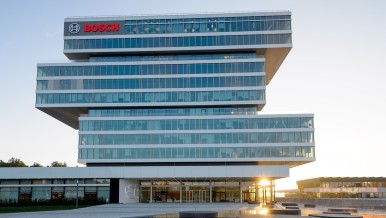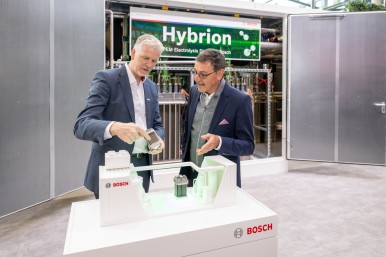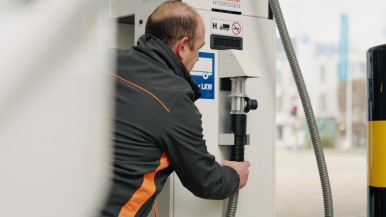As the world’s industry gathers at Hannover Messe over the next few days, everyone and everything will be focused on transformation. Rarely before has the event’s main theme been so topical: the transformation that almost all companies are facing is fundamental and challenging, and climate change means there is no alternative. This trade show is important right now because it highlights an essential dimension of industry: innovation.
When people talk about the importance of industry for Germany, they are usually referring to the some 7.5 million people employed in manufacturing, or to the good 23 percent that manufacturing contributes to gross value added.
According to the German Economic Institute (IW), a remarkable 86 percent of all patent applications in Germany come from industrial companies and closely associated service providers. The core industrial sector alone accounts for more than 78 percent of patent applications. And this even though industry only employs just under one in four people in the nation’s workforce.
This wave of innovation is driven primarily by the considerable upfront investments that manufacturing companies put into the industrial groundwork. According to Stifterverband (the German Association of Donors for the Promotion of Sciences and Humanities), companies invested a total of 98.5 billion euros in research and development in 2019. A good 85 billion euros of that came from manufacturers, and the lion’s share of that came, by the way, from the automotive industry.
To fight climate change, we need more innovations
Of course, companies don’t dole out that kind of money to their development departments for the sheer joy of research. Rather, it’s because they know very well that the only way for cost-intensive industry of the sort found in Germany to secure its success is by ensuring its products and processes are among the very best in the world.
This innovative strength is now more necessary than ever. If we want to make our economy, our mobility, our everyday lives climate neutral, what we need is more technical solutions, not fewer.
Industry, as we all know, has contributed in recent decades not only to prosperity but also to climate change. Yet now it has the chance to go from being part of the problem to being part of the solution.
Much has already been achieved, whether in the form of heat pumps or wind power, fuel cells or biomass. But to further accelerate this transformation, we need growth and technological progress.
In this respect, it’s worrying when the European Patent Office states in its latest overview that the number of applications from Germany has fallen to its lowest level in more than a decade. Or when the German promotional bank KfW reports years of decline in innovation activity among SMEs.
Germany is not threatened by an industrial exodus
These are not good signs. Some doomsayers already see German industry crumbling away like the viaducts of the Sauerland highway. It is true that German companies are setting up not only production lines abroad but research laboratories as well.
But this is a simply a result of their need to be close to customers and markets. Claims that it is evidence of an industrial exodus are, in my opinion, overblown.
Industry will of course undergo profound change. But that doesn’t necessarily mean it will shrink dramatically. Yes, one or two particularly energy-intensive companies may soon relocate to where green electricity or green hydrogen are easier to come by than under Germany’s gray skies.
In contrast, though – and this is just one example – price pressure will push many companies to develop even more efficient processes. And this, in turn, will open up new opportunities.
In any case, the German government expects the green tech sector to account for almost one-fifth of gross domestic product as soon as 2025. But for this major transformation to be successful, we must leave it largely up to the market to determine how best to achieve our shared objective of reducing climate change. Nothing stifles innovation as reliably as excessive dirigisme.
So, ten or twelve years from now, we will certainly see a different economy in Germany. Whether it will be weaker or more powerful than today’s depends on a number of factors. We must succeed in offering electricity from renewables at bearable prices, and we must greatly expand digital infrastructure, streamline bureaucratic processes, and strengthen European cohesion.
Above all, we must finally agree on a coordinated immigration and education policy. And of course, every innovation also needs skilled workers who can then implement the technology: you can’t have electricity without electricians, no matter how modern your power plant. The path ahead is clear – we need to stop being pessimistic and start moving forward.
First published in Handelsblatt on April 12, 2023.





